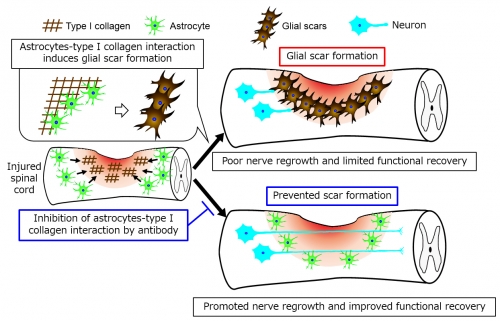研究成果 Research Results
- TOP
- News
- Research Results
- A New Key to Promoting Regeneration of Injured Nerves
A New Key to Promoting Regeneration of Injured Nerves
2017.06.28Research ResultsLife & Health
The research group of Associate Professor Seiji Okada clarified that astrocytes-type I collagen interaction induces glial scar formation that is widely regarded as a principal cause of nerve regeneration failure and poor functional outcome in both rodents and humans with brain or spinal cord injury, and provided a novel therapeutic strategy for inhibiting glial scar formation and improving functional recovery after brain or spinal cord injury.
This research achievement has been published on June 19, 2017 (UK local time), in the online edition of Nature Medicine.
“Glial scars inhibit the therapeutic effects of iPS or neural stem cell transplantation, which is a new hope for treatment of brain or spinal cord injury. This work has major implications for developing a new potential combined therapy with cell transplantation and attenuation of glial scar formation,” says Okada.
For more information about this research, see Interaction of reactive astrocytes with type I collagen induces astrocytic scar formation through the integrin-N-cadherin pathway after spinal cord injury. DOI:10.1038/nm.4354

Fig. A schematic representation of glial scar formation induced by astrocytes-type I collagen interaction.
Injured neurons cannot regrow beyond glial scars.
Inhibition of glial scar formation leads to promoted nerve regeneration and improved functional recovery.
Journal Reference
Interaction of reactive astrocytes with type I collagen induces astrocytic scar formation through the integrin–N-cadherin pathway after spinal cord injury, ,Nature Medicine, 10.1038/nm.4354Research-related inquiries
- TOP
- News
- Research Results
- A New Key to Promoting Regeneration of Injured Nerves































